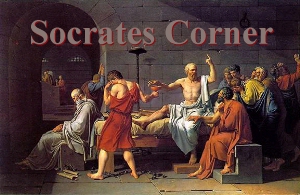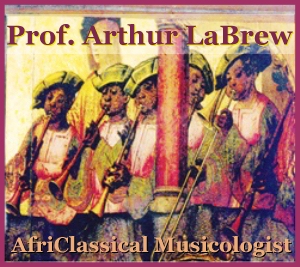Adolf Hitler: the middle years (1920-1932)
We do not know whether Hitler is going to found a new Islam. He is already on the way; he is like Mohammad. The emotion in Germany is Islamic; warlike and Islamic. They are all drunk with wild god. That can be the historic future.
~ Psychiatrist Carl Jung, The Symbolic Life (1939)
Then will come a National Socialist State tribunal; then will November 1918 [Armistice of Compiègne], be expiated; then the heads will roll.
~ Hitler’s testimony at a trial of German Officers (Leipzig, 1930)
How fortunate for leaders that men do not think.
~ Adolf Hitler
Hitler’s Year One: World War I – August 4, 1914
As a historian on Hitler and the Nazi period, one cannot fully nor properly understand Hitler’s middle years (1920-1932) without going back to that singular most transformative experience in Young Hitler’s life, the World War I Years: 1914-1919. Such an epiphany experience were those crucial years to shaping and forming the psychological Weltanschauung (worldview) of Young Hitler, that I consider 1914, not his birth year of 1989, Year One for Adolf Hitler. The start of World War I: August 4, 1914 was the official date where Austria-Hungary was at war with Serbia, and Germany had declared war on Russia and France.
Historian, William Shirer, in his classic treatise, The Rise and Fall of the Third Reich, in his concluding paragraphs of chapter one puts the pivotal period of Hitler’s life in its’ proper historical context leading us from his early period to his middle period years where the reader comes to see the failed, frustrated, sexually abused artist transmute himself in 10 short years to the Man of Destiny history would call Adolf Hitler, “Der Führer” (the Leader). Shirer writes: “To me,” he wrote in Mein Kampf, “those hours came as a deliverance from the distress that had weighed upon me during the days of my youth. I am not ashamed to say that, carried away by the enthusiasm of the moment, I sank down on my knees and thanked Heaven out of the fullness of my heart for granting me the good fortune of being permitted to live in such a time… For me, as for every German, there now began the most memorable period of my life. Compared to the events of this gigantic struggle all the past fell away into oblivion.” What Hitler meant by “those hours” was that pivotal time of August 4, 1914, the date Germany entered World War I; the date Hitler would become a Man of Destiny to lead Germany.
“For Hitler the past, with all its shabbiness, loneliness and disappointments, was to remain in the shadows, though it shaped his mind and character forever afterward,” continued Shirer. “The war, which now would bring death to so many millions, brought for him, at twenty-five, a new start in life.” Later Hitler would write of those heady times in his typical transformative and dystopian language – “Germany will either be a world power or will not be at all.”
Hitler and early Nazism: 1920-1922
With little education and World War I now at an end, Hitler, like millions of other German veterans had little prospects for work. Returning to Munich, in July 1919 he took a voluntary position with the Reichswehr (German army) and was appointed Verbindungsmann (intelligence agent) of an Aufklärungskommando (reconnaissance commando). In other words Hitler’s first real job outside his military service was as a spy for the hated Weimar Republic, charged to influence other veterans, and to infiltrate the German Workers’ Party (DAP), a precursor to the Nazi Party. Hitler soon formed a strong relationship with the DAP founder and leader, Anton Drexler whose radical, revolutionary ideas of Jewish hatred, aggressive German nationalism, anti-Capitalist and anti-Communist Weltanschauung (worldview) greatly appealed to Young Hitler. Fascinated with Hitler’s rhetorical abilities, Drexler soon invited him to join the DAP which he did in September 1919.
Although Hitler was initially hired by the government as a spy against what would be called an early incarnation of the Nazi Party, after his discharged from the army in March 1920, Hitler started working for the NSDAP on a full-time basis. In those early days the primary objectives of the Nazi Party, then headquartered in Munich and a haven of anti-government German nationalism, was to defeat all Marxist organizations while working aggressively to destabilize the hated, treasonous Weimar Republic, which the Nazi Party blamed as cowards and appeasers for agreeing to the onerous terms of the Treaty of Versailles (28 June 1919), and this in the minds of most Germans and particularly the Nazi Party, viewed the Weimar Republic (and their perceived allies, the Communists and Jews) as weak, treacherous, and “decadent.”
Hitler’s venomous beer hall discourses started attracting consistently larger crowds of disaffected Germany young men and veterans. Under Hitler’s leadership the German Workers’ Party was bringing in so many new members that they frequently ran out of application forms. Hearkening back to two key political figures during his struggling artist years during his Vienna Period (1908-13), Schönerer and Lueger. Georg von Schönerer was a popular, nationalist Austrian politician pushing a unified and aggressive Pan-German nationalism. The second major influence on young Hitler was Karl Lueger, Mayor of Vienna from 1897 to his death in 1910.
Hitler perfected his oratorical skills during the 1920s becoming increasingly skilled at using populist subjects, especially the technique of scapegoats, blaming others for the economic privations of the German people; these rhetorical tactics Hitler especially learned from Schönerer. Hitler during this period also mastered using exaggerated physical gestures (see picture below of Hitler practicing his patented oratorical moves) he effectively used to win the hearts and minds of the crowds; techniques he learned from Lueger, who was Mayor of Vienna during the time Hitler lived there.
>From Hitler’s middle period we see his evolution and perfection as a master orator with an almost hypnotic effect on his audience who hung on his every words. Psychiatrist Carl Jung later commenting about Hitler’s rhetorical gifts wrote that he was the “first man to tell every German what he has been thinking and feeling all along in his unconscious about German fate, especially since the defeat in the World War.” Similarly Jung in a later statement from his 1939 book, The Symbolic Life, writing about what kind of utterly diabolical Man Hitler would become appeared to be prophetic: “We do not know whether Hitler is going to found a new Islam. He is already on the way; he is like Mohammad. The emotion in Germany is Islamic; warlike and Islamic. They are all drunk with wild god. That can be the historic future.”
Hitler’s Revolution against Germany: Beer Hall Putsch (1923)
In an earlier article, Hitler’s Reichstag fire and the Progressive pretext for Tyranny, I wrote the following about this pivotal even in Nazi history – ‘The Beer Hall Putsch, also known as the Munich Putsch. This was an unsuccessful coup d’état effort by the Nazi Party leaders Adolf Hitler, Erich Ludendorff and other Kampfbund (“Battle-league”) leaders – to take power by force in Munich, Bavaria, during November 8–9, 1923. Approximately 2,000 Nazi men marched to the Munich Square and engaged in a series of protracted battles with police. The riots led to the death of 16 Nazis and four policemen.’
‘Adolph Hitler and Rudolph Hess were arrested two days later and charged with treason. However, from Hitler’s viewpoint, there were several positives from this coup against Germany. First, the Putsch immediately catapulted Hitler from obscurity to national and international attention. During Hitler’s trial, he made masterful use of the 24 days it lasted to transform negative event into a huge positive venue to make public his National Socialist ideas known to the German people and throughout Europe. Hitler was eventually found guilty of treason and he was sentenced to five years in Landsberg Prison. The second positive to Hitler arose with the writing in prison and eventual publication of his memoir Mein Kampf (My Struggle), which was published in two parts – Vol. I (1925), Vol. II (1926) and transcribed by his fellow prisoner, Rudolf Hess, who essentially was the ghostwriter of this book, transcribing Hitler’s rantings into a coherent narrative. Mein Kampf was an immediate national bestseller and brought Hitler fabulous book royalties and more national and international celebrity.’
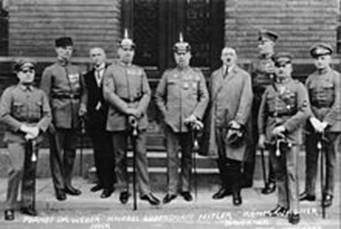
Hitler Consolidates his Power: 1924-1929
Riding high on his ascending national superstardom and international notoriety, Hitler was freed from jail on December 20, 1924, having served only nine months of his five year sentence. The lasting lesson Hitler would learn from the Beer Hall Putsch was his understanding that the pathway to power was through legal and democratic means, not bloody, protracted revolution – that would come after the initial power was acquired. Therefore, the Putsch influenced Hitler to change National Socialist German Workers’ Party (NSDAP) tactics, which would lead to an aggregate dependence on the advancement and promotion of Nazi propaganda. From Dec. 1924- Feb. 16, 1927, as part of his plea agreement with the Bavarian government, Hitler was banned from associating or speaking on behalf of the Nazi Party. However, during this interim period Hitler shrewdly used surrogates like Gregor Strasser, Otto Strasser and Joseph Goebbels (the latter of who would become Hitler’s Minister of Propaganda), to advance his political goals, to further unify and develop the Nazi Party, particularly in northern Germany. A superb organizer, Gregor Strasser directed a more independent political development, stressing the socialist fundamentals of the Nazi Party’s Weltanschauung (worldview).
Hitler’s Ascendancy as Der Führer: 1930-1932
>From antiquity to modern times nature always abhors a vacuum which in the past was usually filled by a demagogue crouching in a dark, dark corner like a rat ready to lurch into history. The grim, social, political, and economic circumstances in Germany under the Weimar Republic from the 1920s through the early 1930s was ripe for social upheaval as the Weimar Republic collapsed under its own incompetence and irrelevancy. The universal economic depression devastated the German economy causing tens of millions of people to be unemployed. Hitler and his Nazi Party essentially was a product of the visceral discontent, hatred and rage of most German citizens after their shameful defeat fifteen years earlier during World War I where the victorious Allied Powers-England, France and America forced the Germans to sign the oppressive Treaty of Versailles (July 1919). As the Germans staggered pathetically through the 1920s under the feckless and incompetent government, known as the Weimar Republic, these existential, evil circumstances set the stage for the ascendancy of a bold, new leader, with new, radical ideas – Adolf Hitler, and his Nazi Party would soon change modern world history forever.
Hitler the Orator
Hitler was a master of rhetoric and political speaking having developed this craft during his Vienna Years (1908-13) where he leaned from two gifted and power Austrian politicians – Schönerer and Lueger. Hitler’s mesmerizing rhetoric had a virtually hypnotic effect on all who heard him and thus appealed to a fast growing numbers of disaffected German citizens frantic for change. Hitler vowed revenge against the weak officials of the Weimar Republic who he felt kept Germany on her knees. To the embittered German citizens, Hitler promised a restored life within a new and magnificent Germany. The Nazis had a particularly strong base with the unemployed, young people, and members of the lower middle class (small store owners, office employees, craftsmen, and farmers).
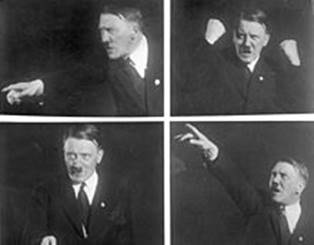
The ascendancy of the Nazi Party in German politics was legendary and rapid. Prior to the economic depression of Oct. 1929, the Nazis were virtually anonymous, winning in the elections 1924 for example, a paltry 3 percent of the vote to the Reichstag (German parliament). Nevertheless, by the 1932 elections, the Nazis would win 33 percent of the votes, above every other political party in Germany, yet the Nazis did not achieve a plebiscite (majority) in the German Parliament or Reichstag, therefore on the surface it seems that Hitler and the Nazis “lost.” Yet, here is where Hitler one once again beat the odds and cement is reputation as a Man of Destiny. Thus, despite that facts that the Nazis would not gain a majority in democratic elections, the aging and moribund President Paul von Hindenburg offered and the dynamic young Adolf Hitler a position on his ticket, Hitler quickly saw an opportunity to snatch victory from the jaws of defeat and formed a unified National Socialism coalition with von Hindenburg’s conservatives. After months of intense negotiations, the President Paul von Hindenburg appointed Hitler Chancellor of Germany in on January 30, 1933.
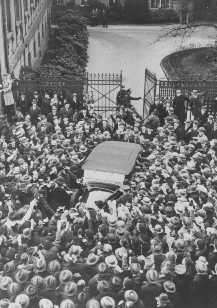
– National Archives and Records Administration, College Park, Md.
Hitler Rising, Russia Rising
Earlier this week I wrote a posting on Facebook posting to demonstrate just like in Hitler’s time the political dynamics are the same as today. Remember, Nature abhors a vacuum. Wherever there is a dearth of leadership like with Obama’s 7-year feckless administration, stronger men will arise and displace the weaker. Recounting Putin’s speech before the United Nations earlier last week, I wrote: America, I’m not sure if you realized what happened yesterday at the United Nations. We literally witnessed History. Obama didn’t step down from the stage as the “Leader of the Free World.” Russia’s Vladimir Putin, a real man and a strong leader, kicked Obama off the world’s stage like a NFL punter kicks an extra point.
Now we hear this morning that Russia is bombing the hell out of Syria and demands that Obama take the U.S. military out of Syria now. (Trump said on O’Reilly last night, let it be Putin’s problem). Note that China has moved a nuclear submarine to the Middle East. Obama’s treachery, duplicity and feckless foreign policy for 7 years has only turned the Middle East into a giant catastrophe. He had no intention of getting rid of ISIS, he was deceitfully using them (and the so-called U.S.-CIA trained ‘Syrian Rebels’) to fight a proxy war against his real enemy, Syrian dictator, Bashar al-Assad.
The new coalition of Russia, fighting Syrian ‘Rebels,’ ISIS and Muslim Chechen terrorists from the Russian North Caucasus fighting in Syria; Iran, fighting Sunni ISIS fighters in Iraq and Syria; China, fighting Muslim Chinese Uighurs from their Western province; Syria, fighting Muslim Sunni ISIS and Syrian ‘Rebels’ i.e., terrorist coalitions. Now the Russia’s Vladimir Putin has a strong coalition I believe that ISIS will be defeated or at least neutralized and prevented from causing existential chaos in the Middle East any further. This coalition is there to stop ISIS combatants fighting with ISIS in Syria from re-entering their country unless it’s in a body bag and to protect churches Christians and Jews living in Syria who would most certainly be slaughtered by ISIS should they succeed in toppling Bashar Al-Assad.
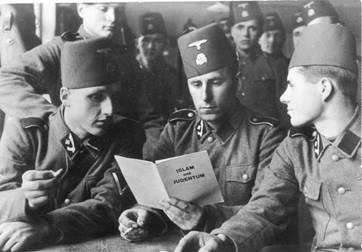
Republican presidential candidate Dr. Ben Carson is warning voters to remember history, to learn from history, and be careful, or they could see the second coming of Adolf Hitler in the United States. Carson made the comments on Wednesday while speaking at a campaign event in New Hampshire, saying if people are willing to give up their freedom, a government similar to the Nazi regime could rise up.
“If you go back and look at the history of the world, tyranny and despotism and how it starts, it has a lot to do with control of thought and control of speech,” Carson said, according “If people don’t speak up for what they believe, then other people will change things without them having a voice.
When Carson rightly says that “Hitler changed things there and nobody protested. Nobody provided any opposition to him,” those words have an even more prophetic meaning today and are derivative of a famous quote by Hitler, “How fortunate for leaders that men do not think.”
Ellis Washington is a former staff editor of the Michigan Law Review (1989) and law clerk at the Rutherford Institute (1992). Currently he is an adjunct professor of law at the National Paralegal College and the graduate school, National Jurisprudence University, where he teaches Constitutional Law, Legal Ethics, American History, Administrative Law, Criminal Procedure, Contracts, Real Property, and Advanced Legal Writing, among many other subjects.
A founding board member and Director of Salt and Light Global, LLC, Washington is a co-host on “Joshua’s Trial,” a radio show proclaiming a Judeo-Christian worldview and conservative political philosophy.
A graduate of John Marshall Law School (1994), the University of Michigan (1986), and DePauw University (1983), he did post-graduate studies in History at Harvard University GSAS and in Law at Harvard Law School (1988-89). Washington’s latest law review articles include: “Nigger Manifesto: Institutional, Intellectual, Ideological Racism inside the American Academy” (forthcoming 2015) and “Social Darwinism in Nazi Family and Inheritance Law” (2011).
Author of 9 books, Washington’s latest opus is a 2-volume collection containing over 300 essays, articles, and Socratic dialogues dedicated to his intellectual mentor and friend, U.S. Supreme Court Justice Clarence Thomas – The Progressive Revolution: History of Liberal Fascism through the Ages (University Press of America, 2015) – Volume III – 2010-11 Writings and Volume IV – 2012-2013 Writings . Visit his Law and History blog, EllisWashingtonReport.com, an essential repository of writings based on a Natural Law worldview and jurisprudence dedicated to educating the next generation of young conservative intellectuals and teaching the youth about real history, law, philosophy, politics, while rejecting the existential, militant Marxist propaganda taught in today’s public schools, colleges, and universities.
© Copyright 2015 by Ellis Washington
http://www.renewamerica.com/columns/washington/151003
Category: Commentary



